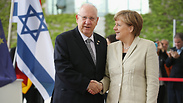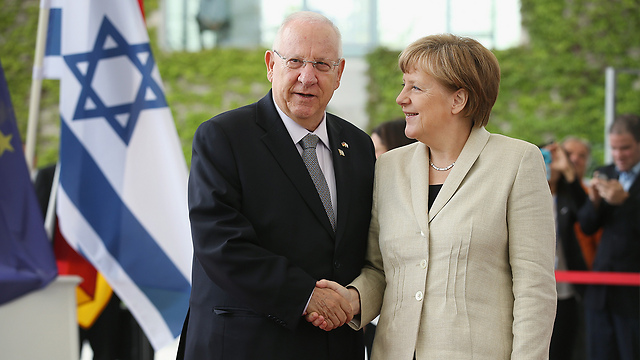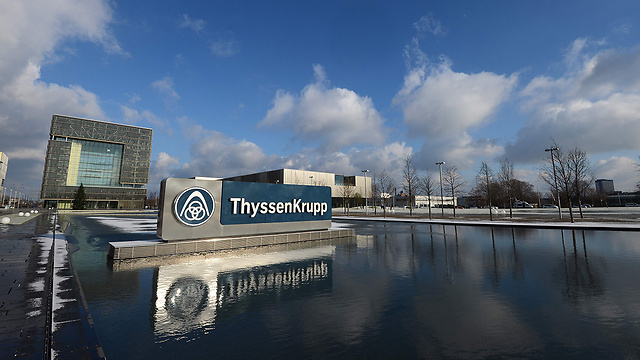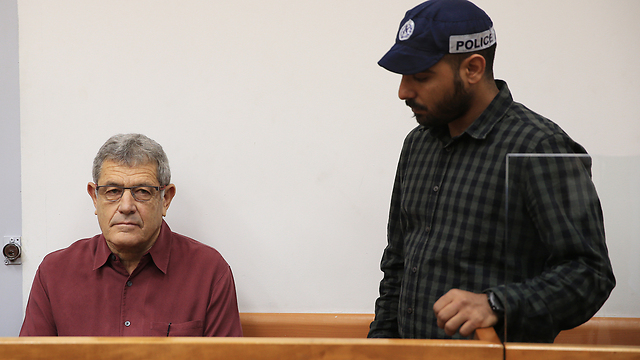

Merkel informed Rivlin of Germany-Egypt sub deal
Rivlin asked by Defense Ministry to raises concerns over deal with the Germans; Merkel sheepishly tells the Israeli president Germany received permission from senior Israeli official, leading then-defense minister Ya'alon to confront Netanyahu, who denied transaction.
President Reuven Rivlin was the Israeli official who expressed his concern over Germany's intention to sell advanced submarines to Egypt in a meeting with Chancellor Angela Merkel during his visit to Berlin in May 2015 to mark 50 years of diplomatic relations between the two nations.
Yedioth Ahronoth journalist Alex Fishman reported on Tuesday morning a senior Israeli official had expressed concern on behalf of the defense establishment to Merkel regarding the planned sale. On Tuesday evening, Channel 10's Raviv Drucker reported the official was none other than Israel's president.
In response to the president's concern, Merkel expressed embarrassment. After examining the matter, Merkel told Rivlin that a senior Israeli official had given Germany permission to carry out the deal with the Egyptians—without senior members of the defense establishment or the president being aware.
The German agreement to sell four submarines and two anti-submarine ships to Egypt raised the possibility that behind the scenes there was a tripartite deal under which Israel would approve the German deal with the Egyptians and in return receive a substantial discount on the purchase of ships to protect offshore gas platforms.
The planned German-Egyptian submarine deal is the second such agreement between the two nations.
In 2009, then-Minister of Defense Ehud Barak and Prime Minister Benjamin Netanyahu gave the Germans permission to sell less advanced submarines to Egypt, which was then under the rule of President Hosni Mubarak.
Following the ascension of President Abdel Fattah al-Sisi in 2014, another deal was made to sell Egypt submarines and ships. However, this time the deal encountered opposition from Defense Minister Moshe Ya'alon and other defense ministry officials.
In contrast to the previous deal, this one involved advanced submarines similar to those purchased by Israel.
When Ya'alon—who only by chance discovered the deal—confronted Netanyahu about Israel allowing Germany to sell the vessels to Egypt, Netanyahu denied having authorized the transaction.
Only after Rivlin returned from Berlin did Ya'alon learn for the first time that Israel had indeed given the green light to the deal despite objections from top defense officials.
The Germans claimed these new agreements were made during their meeting with Netanyahu's representative, attorney Yitzhak Molcho. Molcho is a partner and relative of attorney David Shimron, who is a suspect in the police investigation into the sale of the submarines to Israel.
One person who can aid investigators in solving the puzzle is ThyssenKrupp's representative in Israel, Miki Ganor, who was arrested last week on suspicion of bribery. Police are hoping to secure Ganor as a state witness by the end of the week.
Sources involved in the investigation believe that Ganor holds sensitive material related to other Israeli security deals and that if he becomes a state witness, he will implicate other officials in the defense establishment.


















